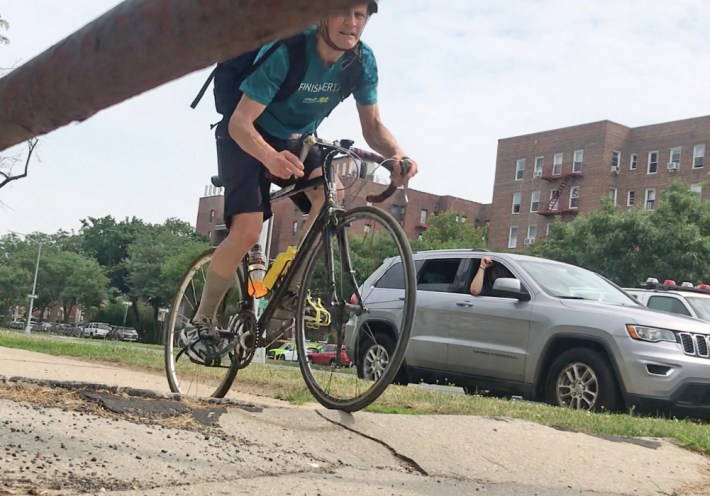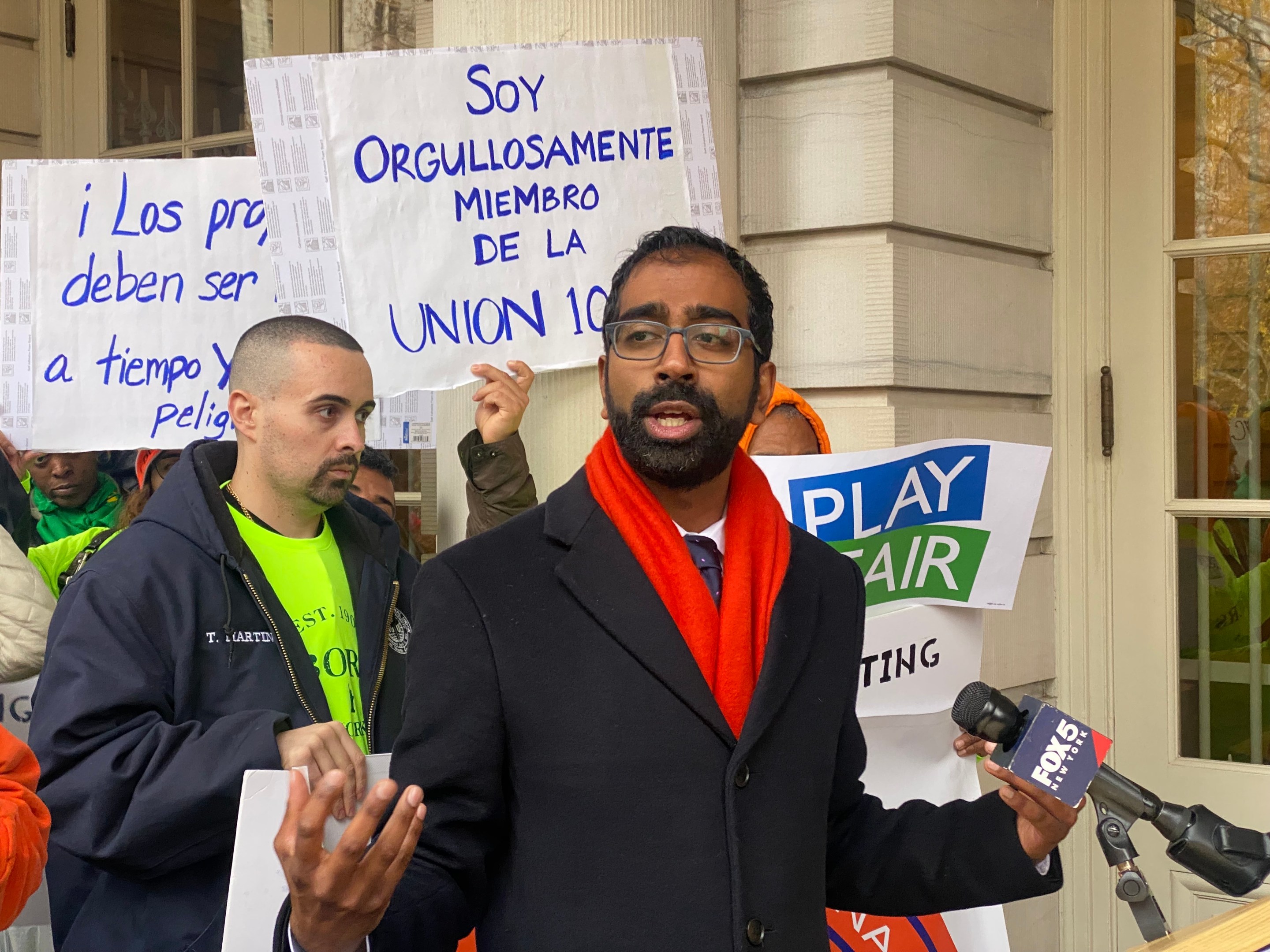
The City Council wants to force the Parks Department to figure out how to cut its often-delayed project timelines by 25 percent, a move that could speed up critical fixes of the agency's vast network of bike and pedestrian greenways, like cracked-up Ocean Parkway, whose repair has been delayed for years.
The department has been a poor steward of its bike infrastructure that provide crucial links in the city's cycling network, such as the 19th-century greenway in southern Brooklyn. Parks officials again delayed repair work of the busted up path by a year setting the completion date for March 2024, Streetsblog has learned — five years after it first got funding.
Agency officials have said timelines have been stretched because of the pause in city work during Covid-19 and also chalked up more recent delays to having to do more reviews of contractors.
Another project to overhaul a small pedestrian and bike bridge on the on the Hudson River Greenway uptown in Fort Washington Park, meanwhile, will have taken Parks 15 years to finish by the time it's scheduled to be complete next year — a year longer than it took to build the Brooklyn Bridge in the 1800s.
Council Member Shekar Krishnan (D–Jackson Heights) rallied for a set of bills he introduced to address lengthy timelines like these Tuesday ahead of an oversight hearing with Parks Department leaders at City Hall.
"The infrastructure projects, the transportation and green space projects, need to be progressing at a much much faster rate," Krishnan told Streetsblog. "[We need] to get the Parks Department — and every city agency, frankly — to be on record to look at all of its different aspects of its capital process and propose its plan for how to reduce by 25 percent."
The Department claims its capital projects take between two-and-a-half and three-and-a-half years — a timeline divided into design, procuring a contractor, and construction — but researchers with the think tank the Center for an Urban Future estimate that major Parks projects take around seven years from initial funding to smile-filled ribbon-cutting.
Parks Commissioner Sue Donoghue told the Council that the agency follows the same process as other departments.
"Constructing anything in New York City is an incredibly complicated undertaking, and it’s no secret that the city’s capital process is complicated and lengthy," Donoghue said. "New York City Parks does our best to deliver a finished capital project as soon as possible, but we also need to make sure that the final project has a full useful life as a valuable public asset and that the process is conducted in accordance with the numerous laws and regulations put in place over the years."
One law proposed by Krishnan would require Parks to come up with a blueprint by Dec. 1, 2023, to trim the timelines by a quarter. Another piece of legislation would add more details to the agency's online tracker, such as reasons for delays, cost overruns, and when the project got full funding.
Delays often result when something unexpected comes up, forcing Parks to run changes by other agencies, such as the Mayor's Office of Management and Budget, which gets 30 days each time to review them, said Eli Dvorkin, the policy director for the Center for an Urban Future.
"If [OMB] submits questions, that restarts the clock. That can easily happen every single time a change order is submitted," Dvorkin told Streetsblog. "Is it just one month here and two months there? Over the course of seven years, it is. It’s all of those accumulating delays."
Parks has a whopping 660 active capital projects in one of the three stages, Therese Braddick, the agency's deputy commissioner for capital projects, told lawmakers during the Dec. 6 hearing.
Parks had to pause more than 400 procurements during the first year of the pandemic from March 2020 to March 2021, and the agency's average time to design projects also slowed down from 12 months to up to 15, according to Braddick.
"During that time, we couldn’t bid out, award, or register construction contracts and we couldn’t hire design or construction management consultants,” the deputy commissioner said.
The Ocean Parkway project is a prime example of the Parks Department's tardiness at fixing crucial bike infrastructure.
The 1894 bike and pedestrian mall connecting the south end of Prospect Park to Coney Island — the oldest such path in the city — has long been deteriorating with cracks and holes, making it nearly unusable (and exceptionally dangerous at night), and the city finally agreed to fix a section between avenues R and X in 2019.

The project made it from design into procurement in 2020 and construction was supposed to start in 2021 and wrap up in 2022. But then the pandemic delayed the start of construction work until 2022, pushing back completion to 2023. The project's online tracker now has a finishing date set for March 2024, another year delayed.
Parks spokesperson Meghan Lalor said that's because the lowest bidding contractor for the work came in at more than 10 percent cheaper than the next-lowest applicant, triggering a city review under a 2007 executive order to make sure the company getting the deal was paying fair wages.
"We appreciate the intent of this legislation and are happy to work with the Council to improve public awareness of capital process reform efforts," said agency rep Lalor.
Mayor Adams in April launched a task force in April to look into reforms of the municipal capital process, made up of several agencies, the city comptroller's office, utilities, construction companies, consultants, engineers, and architecture firms.
The group released its first set of recommendations in October, which included improving preparations before work starts, standardizing approvals, updating procurement regulations, and bundling design and construction into one contract, also known as design-build.
Many Parks projects are too small to attract design-build firms, but officials are looking at bundling some together together like their notoriously expensive comfort stations, which cost an average of $3.5 million apiece to build, according to Braddick.






